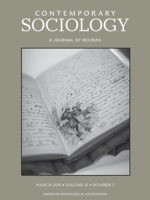What does the emotional landscape of Trumpism look like?
The stunning birth and rapid rise of the American Tea Party movement took both political opponents and commentators by surprise. In its aftermath, a wide range of scholarly works have been trying to explain this political development by exploring the so-called ‘emotional landscape’ of the new American Right. The populist nature of the new American Right, this bourgeoning literature agrees, cannot be grasped through the lens of simply ‘ideas’. Rather, its response to the 2009 financial crisis, and the destructive dynamics of inequality and alienation which economic globalization brings with it, must be approached through the prism of affect or emotion. In short: We need to get a handle on what New Right voters feel. Not simply what they ‘think’.
One such work is Arlie Russell Hochschild’s Strangers in Their Own Land: Anger and Mourning on the Political Right (2016). The book was researched during the Obama years, but published and launched in the period where Donald Trump secured the Republican nomination, took the presidential oath and - along with Breitbart-advisor Steve Bannon - moved into the oval office. Based on in-depth ethnographic research, and sincerely attempting to ‘scale the empathy wall’, Hochscild’s moving analysis has been deservingly endorsed by such diverse figures as leftwing darling Noam Chomsky and classic conservative David Brooks. In the US, it was a 2016 national book award finalist. In Europe, high-end magazines and journals have paid it unusual attention. And - shortly after Trump’s presidential win - The New York Times made it part of its “6 books to Understand Trump’s America”.
Hochschild’s book in other words, is a relevant place to begin and continue more than purely scholarly discussions over how to unpack and understand the ‘Trump moment’ in Western democracy. In an issue of Contemporary Sociology just out, DIIS-researcher Vibeke Schou Tjalve does just that. Indisputably, Tjalve writes, Hochshild’s analysis of hurt, loss, and nostalgia amongst a dispossessed Louisiana populace is crucial to unpacking their paradoxical support for a Tea Party movement - a movement whose policies on welfare, state regulation, and, crucially, environmental safeguards seem so blatantly to run against that populace’s own best interests.
Yet, more than one year into the Trump presidency, Tjalve asks, do the categories of ‘hurt’, ‘mourning’ or ‘nostalgia’ truly exhaust what is going on? Clearly, there is a large voting population that is rural, poor, and disconnected. And yet equally clear, the Trumpian win has revealed a Right which is something else: would-be-intellectual, urban, post-modern, blogging, tech-savvy, and often young. This – highly diverse - new Right too is fruitfully approached through the prism of emotions. Yet the sentiments that both informs and are propelled by this new Right, are not those of mourning. Rather, they range from a strangely detached and postmodern irony, to postures of relativism, revolt and disruption. Unpacking and explaining this new Right too – including its resonance with broader public feelings of end-of-days-nothing-matters-burn-the-world-down sense of futility - is an important task for future research.
Amongst the many questions of such a research agenda, is the wide-ranging one of the new Right’s broader reach and long-term social and political consequences. In other words: How does the emotional landscape of this new Right relate to a twenty first century context of new social media, ‘fake news’ and a profound public exhaustion of faith in ‘democracy’ or ‘truth’? As Tjalve concludes, taking questions like that seriously necessarily involves taking an interest in early twentieth century Europe – a period whose social turmoil and deep sense of civilizational decay has important parallels to, and serves as a source of intellectual inspiration, for the new American, and more broadly Western, Right.
To download Tjalve’s comment from Contemporary Sociology click here:
http://journals.sagepub.com/doi/pdf/10.1177/0094306118755398
PLEASE ALSO download this important erratum to the original comment. In the original version, a sentence reads ‘the multicultural left which I so vehemently oppose’. It should of course read, ‘the multicultural left which it (the New American Right) so vehemently opposes’.
http://journals.sagepub.com/doi/pdf/10.1177/0094306118771672


